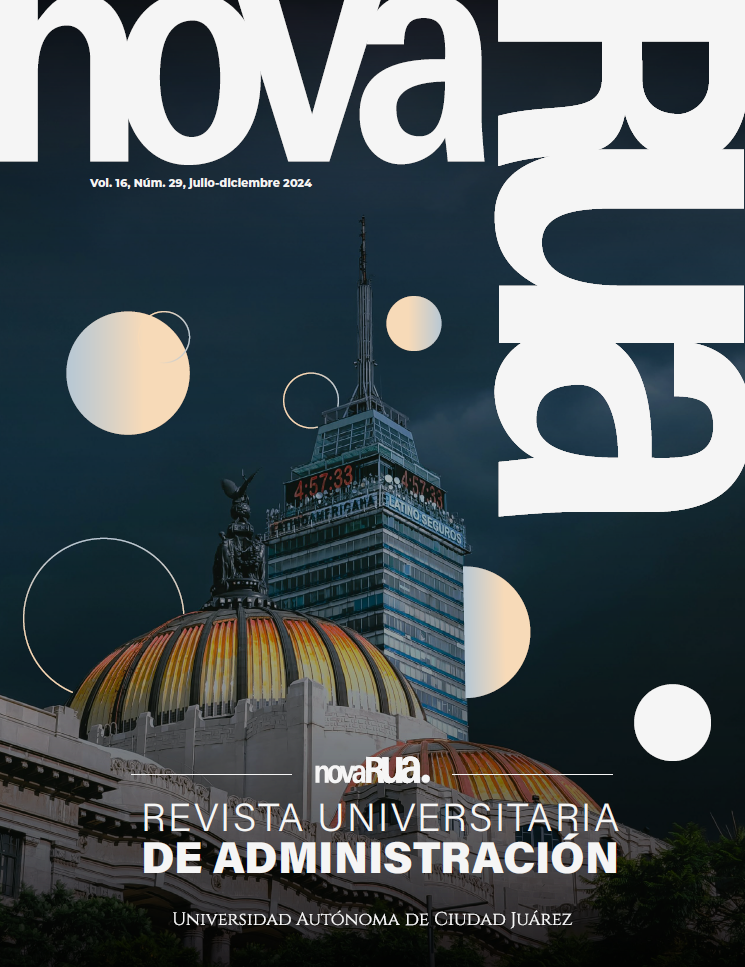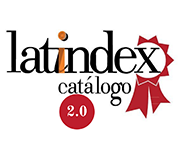A methodologic framework for the systemic management of knowledge
DOI:
https://doi.org/10.20983/novarua.2024.29.3Keywords:
Digital and Cognitive Transformation, Knowledge Management, Systemic aproach, Knowledge Representation, KMoS-SSAAbstract
In the contemporary era, technology has become a pervasive and pivotal force, exerting a profound influence on nearly every aspect of human life and heralding the advent of a transformative era characterized by digital and cognitive advancement; those who adapt to it enter the Cognitive Era, in which artificial intelligence (AI) and information technology (IT) support decision-making processes. Nevertheless, this transition can rise feelings of unease and apprehension due the necessity to implement swift and frequently misguided organizational and technological alterations, driven by an oversimplification of intricate domains with the intention of rendering them more accessible to AI and IT. This article presents the KMoS-SSA methodological framework as an integrative tool that merges knowledge management with the systems approach to develop effective solutions in complex domains. This holistic approach recognizes the importance of tacit specialist knowledge and offers a suitable way to address associated challenges with digital and cognitive transformation.
References
Aviad, A., Węcel, K., y Abramowicz, W. (2016). A Semantic Approach to Modelling of Cybersecurity Domain. Journal of Information Warfare, 15(1), 91-102. https://www.jstor.org/stable/26487483.
Checkland, P. B. (1989). Soft Systems Methodology. Human Systems Management, 8(4), 273-289. https://doi.org/10.3233/hsm-1989-8405.
Checkland, P., y Poulter, J. (2020). Soft Systems Methodology. En Reynolds, M. y Holwell, S. (eds), Systems Approaches to Making Change: A Practical Guide. Springer. https://doi.org/10.1007/978-1-4471-7472-1_5.
De Mello, F. L. y De Carvalho, R. L. (2015). Knowledge Geometry. Journal of Information & Knowledge Management, 14(04), 1550028-1550028. https://doi.org/10.1142/s0219649215500288.
Farnese, M. L., Barbieri, B., Chirumbolo, A., y Patriotta, G. (2019). Managing Knowledge in Organizations: A Nonaka’s SECI Model Operationalization. Frontiers in Psychology, 10, 2730. https://doi.org/10.3389/fpsyg.2019.02730.
Gu, J. (2016). The Meta-synthesis System Approach. En Nakamori, Y. (Ed), Knowledge Synthesis. Translational Systems Sciences. Springer. https://doi.org/10.1007/978-4-431-55218-5_5.
Gu, J., y Tang, X. (2004). Wu-li Shi-li Ren-li system approach to a major project on the research of meta-synthesis system approach. International Journal of Knowledge and Systems Sciences, 1(1), 70-77. https://citeseerx.ist.psu.edu/document?repid=rep1&type=pdf&doi=5360c354d8e0fffe9e2e67dbf0de161e60c48352.
Hadi, A. H., Pramuhadi, G., Susantyo, B., y Wahyono, E. (2023). Sustainability Concept Design of Robusta Coffee Agroindustry Kalibaru with Soft System and Decisions Support System Methods. International Journal of Sustainable Development & Planning, 18(5), 1339-1350. https://doi.org/10.18280/ijsdp.180504.
Hanafizadeh, P., y Mehrabioun, M. (2022). The Nature of Hard and Soft Problems and Their Problem-Solving Perspectives. Journal of Systems Thinking in Practice, 1(3), 22-48. https://doi.org/10.22067/jstinp.2022.79419.1024.
Holste, J. S., y Fields, D. (2010). Trust and tacit knowledge sharing and use. Journal of Knowledge Management, 14(1), 128-140. https://doi.org/10.1108/13673271011015615.
Jackson, M. (2017). Engineering by Software: System Behaviours as Components. En Mazzara, M. y Meyer, B. (eds), Present and Ulterior Software Engineering. Springer. https://doi.org/10.1007/978-3-319-67425-4_1.
Jiménez-Galina, A., Olmos-Sánchez, K., Licona-Olmos, J., y Maldonado-Macias, A. (2023). Necesidad de una metodología para la representación del conocimiento para sistemas complejos en DEI. Enfoque empírico-teórico. 11th International Conference in Software Engineering Research and Innovation (CONISOFT). https://conisoft.org/2023/assets/docs/sessionprogram/SessionsProgram_CONISOFT-2023_v60_231030_230231.pdf.
Kotseruba, I., y Tsotsos, J. K. (2018). 40 years of cognitive architectures: core cognitive abilities and practical applications. Artificial Intelligence Review, 53(1), 17-94. https://doi.org/10.1007/s10462-018-9646-y.
Larson, E. J. (2021). The myth of artificial intelligence why computers can’t think the way we do. The Belknap Press of Harvard University Press.
Nakamori, Y. (2020). Fusing systems thinking with knowledge management. Journal of Systems Science and Systems Engineering, 29, 291-305. https://doi.org/10.1007/s11518-019-5450-8.
Nikhlis, N., Iriani, A., y Hartomo, K. D. (2020). Soft System Methodology (SSM) Analysis to Increase the Number of Prospective Students. INTENSIF: Jurnal Ilmiah Penelitian Dan Penerapan Teknologi Sistem Informasi, 4(1), 63-74. https://doi.org/10.29407/intensif.v4i1.13552.
Nonaka, I., y Takeuchi, H. (2016). The Knowledge-Creating Company: How Japanese Companies Create the Dynamics of Innovation. Hbs.edu. https://www.hbs.edu/faculty/Pages/item.aspx?num=38411.
Olmos-Sanchez, K., y Rodas-Osollo, J. (2020). Helping organizations manage the innovation process to join the Cognitive era. 8th International Conference in Software Engineering Research and Innovation (CONISOFT). https://doi.org/10.1109/conisoft50191.2020.00012.
Olmos-Sánchez, K., & Rodas-Osollo, J. (2016). A Strategy of Requirements Engineering for Informally Structured Domains. International Journal of Combinatorial Optimization Problems and Informatics, 7(2), 49-56. https://ijcopi.org/ojs/article/view/39.
Polanyi, M. (1958). Personal Knowledge. University of Chicago Press. https://philpapers.org/rec/POLPK-3.
Reynolds, M., y Holwell, S. (2020). Systems Approaches to Making Change: A Practical Guide. Springer. https://doi.org/10.1007/978-1-4471-7472-1.
Rodas-Osollo, J. (2023). An Interesting Adventure accompanied by CMCg.I model. Zenodo. https://doi.org/10.5281/zenodo.10111223.
Rodas-Osollo, J., y Olmos-Sánchez, K. (2022). Toward Optimization of Medical Therapies with a Little Help from Knowledge Management. IntechOpen. https://doi.org/10.5772/intechopen.101987.
Rodas-Osollo, J., Olmos-Sánchez, K., y Kotlyarova, I. (2024). A conceptual framework-KMoS-SSA: synergizing quality management and technology. Croatian Quality Managers Society. https://hdmk.hr.
Rodas-Osollo, J., Olmos-Sánchez, K., Portillo-Pizaña, E., Martínez-Pérez, A., y Alemán-Meza, B. (2021). An Archetype of Cognitive Innovation as Support for the Development of Cognitive Solutions in Smart Cities. En Ochoa, A, Vargas, G. y Espinosa, J. (Eds.), Innovative Applications in Smart Cities. CRC Press. https://www.taylorfrancis.com/chapters/edit/10.1201/9781003191148-8/archetype-cognitive-innovation-support-development-cognitive-solutions-smart-cities-jorge-rodas-osollo-karla-olmos-s%C3%A1nchez-enrique-portillo-piza%C3%B1a-andrea-mart%C3%ADnez-p%C3%A9rez-boanerges-alem%C3%A1n-meza.
Rohajawati, S., Fairus, S., Saragih, H., Akbar, H., y Rahayu, P. (2021). A combining method for systems requirement of knowledge-based medical hazardous waste. TEM Journal, 10(4), 1761-1768. https://www.proquest.com/scholarly-journals/combining-method-systems-requirement-knowledge/docview/2702222057/se-2.
Saadah H. (2010). Soft Systems Methodology in Environment-Aware Case-Based Reasoning System Analysis. Information Technology Journal, 9, 467-473. https://scialert.net/abstract/?doi=itj.2010.467.473.
Tona, O., & Asatiani, A. (2023). Designing digital solutions for sustainability: Navigating conflicting stakeholder requirements with dignity in mind. Journal of Information Technology Teaching Cases, 0(0). https://doi.org/10.1177/20438869231216995.
Trochim, W. M., Cabrera, D. A., Milstein, B., Gallagher, R. S., y Leischow, S. J. (2006). Practical Challenges of Systems Thinking and Modeling in Public Health. American Journal of Public Health, 96(3), 538-546. https://doi.org/10.2105/ajph.2005.066001.
Yang, J. T., y Wan, C. S. (2004). Advancing organizational effectiveness and knowledge management implementation. Tourism Management, 25(5), 593-601. https://doi.org/10.1016/j.tourman.2003.08.002.
Zahid, A., Sharma, R., Wingreen, S. C., y Anushia, I. (2022). Soft systems modelling of design artefacts for blockchain-enabled precision healthcare as a service. AIS Electronic Library (AISeL). https://aisel.aisnet.org/iceb2022/42/.
Downloads
Published
Issue
Section
License
Copyright (c) 2024 Jorge Rodas-Osollo, Karla Olmos-Sánchez

This work is licensed under a Creative Commons Attribution-NonCommercial-ShareAlike 4.0 International License.
All contents of the electronic edition of the journal are distributed under a license and distribution "Creative Commons Attribution-Noncommercial-ShareAlike 4.0 International" (CC-BY-NC-SA). You can see from here the informative version of the license.
Those authors/publications as having this journal agree to the following terms:
a) Is allowed and recommends authors / as disseminate their work via the Internet (p. eg .: institutional telematic files or on their website), which can produce interesting exchanges and increase appointments of the published work. (See The Effect of Open Access).












